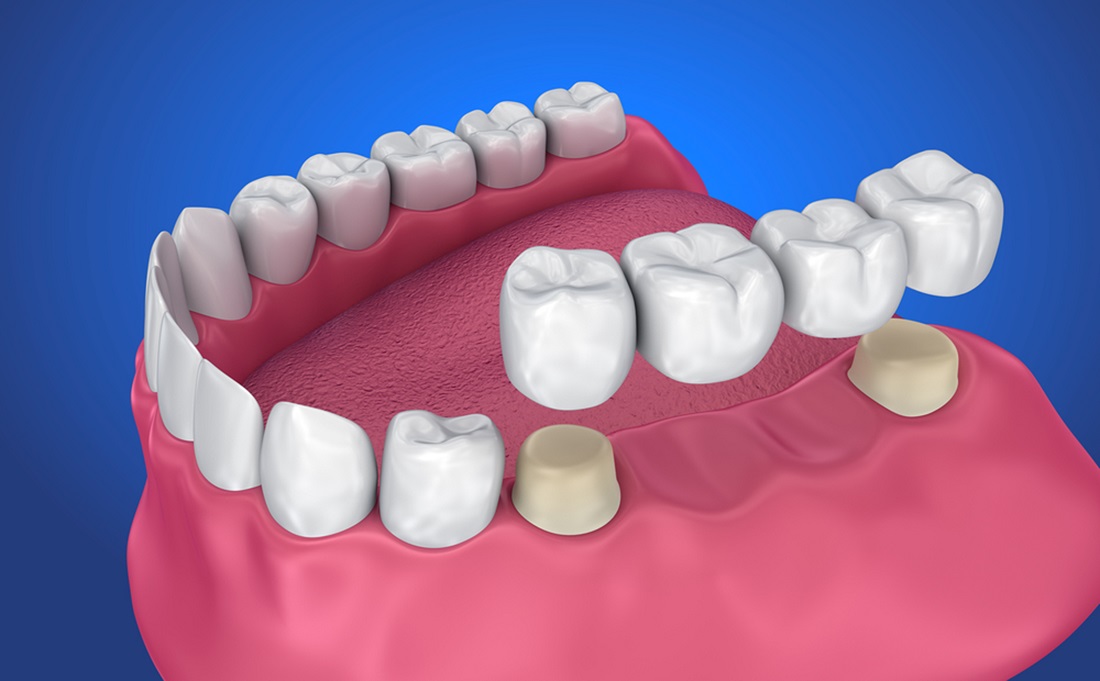Replacing those who have missing teeth is often a priority for their oral and overall health and confidence. Harmony Dental offers dental bridges near you as a durable, long-lasting tooth replacement option. Continue reading to learn if dental bridges are the right choice for you.
What is a Dental Bridge?
A dental bridge is a replacement tooth that typically uses the teeth on each side of the gap created by the missing tooth as anchors for support. A dental bridge can be made from various metals such as porcelain and metals, and most often, they are customized by a dentist near you to blend in perfectly with your smile.
What Are the Types of Dental Bridges?
There are four main types of dental bridges in Waterloo, including:
1. Traditional Dental Bridges
This is the most common type of dental bridge available. A traditional dental bridge covers a gap with natural, healthy teeth on each side. The false tooth is supported in the mouth using dental crowns placed over these naturally healthy teeth. This means our dentist in Waterloo will have to remove some healthy enamel on these remaining natural teeth to fit the crowns over them and place the dental bridge.
2. Cantilever Bridges
A cantilever bridge is similar to a traditional dental bridge, and they still use dental crowns to attach to surrounding teeth and hold the bridge in place. However, unlike traditional bridges, cantilever bridges only need one tooth to use an anchor. This makes them ideal for replacing molars with only one natural tooth beside the gap.
3. Maryland Bridges
These bridges are also similar to traditional bridges in that they use the two natural teeth on each side of the gap to anchor the first tooth. However, instead of using dental crowns, they use wings made of metal or porcelain to attach to the back of these teeth and hold the false tooth in place. These are more conservative than traditional or cantilever bridges because they do not require our dentist to alter your remaining natural teeth. The metal or porcelain clasps can be hidden discreetly behind the teeth, so the bridge will blend in easily with your smile.
4. Implant-Supported Bridges
Implant-supported bridges are the most permanent form of bridge available, and they use surgically-placed implant posts rather than dental crowns or wings as anchors in the mouth. Each false tooth will have a dental implant under it to anchor it in place. This means that this dental bridge does not require the use of surrounding teeth. These are the most reliable bridges but come with the highest price point and take the longest to place.
Cost of Dental Bridges
Each type of dental bridge has a different cost, but certain factors will influence the cost of any treatment. Some things that may affect the cost of your treatment include the number of false teeth that need to be used, the material that the bridge is made from, the location of the bridge in your mouth, and our dentist’s experience.
The cheapest form of dental bridge is a Maryland bridge, costing between $1500-$2500, and the most expensive are implant-supported bridges, costing between $5000-15000.
Visit Harmony Dental
A missing tooth or teeth can affect your confidence and hinder your ability to eat and speak easily. At Harmony Dental, we offer dental bridges to help you restore your smile and enhance your quality of life. Please get in touch with us to book a consultation today!

